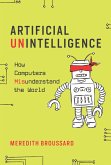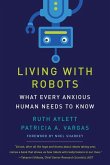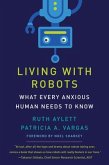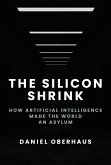ARTIFICIAL INTELLIGENCE FOR BEGINNERS: Get a concise, informative overview of AI ethics and policy and how it could impact our society.
Artificial intelligence, or AI for short, has generated a staggering amount of hype in the past several years. Is it the game-changer it's been cracked up to be? If so, how is it changing the game? How is it likely to affect us as customers, tenants, aspiring home-owners, students, educators, patients, clients, prison inmates, members of ethnic and sexual minorities, voters in liberal democracies?
This book offers a concise overview of moral, political, legal and economic implications of AI. It covers the basics of AI s latest permutation, machine learning, and considers issues including transparency, bias, liability, privacy, and regulation.
Artificial intelligence, or AI for short, has generated a staggering amount of hype in the past several years. Is it the game-changer it's been cracked up to be? If so, how is it changing the game? How is it likely to affect us as customers, tenants, aspiring home-owners, students, educators, patients, clients, prison inmates, members of ethnic and sexual minorities, voters in liberal democracies?
This book offers a concise overview of moral, political, legal and economic implications of AI. It covers the basics of AI s latest permutation, machine learning, and considers issues including transparency, bias, liability, privacy, and regulation.
"A nice, high-level view of some of the issues surrounding the adoption of artificial intelligence....a good read to help people understand key issues in having AI make the major impact on society that it will."
Forbes.com
"A text that deserves to be read widely....It s a book that one could recommend to any individual without feeling guilty about sharing an overly complex topic. Zerilli et al are exemplary in the clarity of their explanations of AI and its influence on society."
LSE Review of Books
"The release of A Citizen s Guide to Artificial Intelligence is well timed....The breadth of topics covered means that there is something to learn for everyone, from experts in AI to lay citizens curious about the role of AI in their lives. Students of technology and of ethics will find it particularly valuable."
Physics World
"A very good book....surprisingly warm and human....deserves to be widely read....John Zerilli, et al, give an effective, very balanced exploration of artificial intelligence."
Popular Science
"A Citizen s Guide to Artificial Intelligence is a text that ought to be read widely. The book s subject matter is highly relevant, and it provokes many probing questions that deserve further consideration on the part of the reader and broader society."
London School of Economics
Endorsements:
With the explosive expansion of cloud computing capacity, mobile communication technologies, and the internet of things over the past couple of decades, AI systems have become an increasingly unavoidable indeed pervasive part of our everyday lives. And yet, many of us have very little idea of how these technologies actually work, or of where, when, and how they are being used by law enforcement agencies, private companies, and governments. The authors of A Citizen's Guide to Artificial Intelligence do a masterful job of opening a public conversation that promises to redress this troubling knowledge gap. The book casts an interdisciplinary floodlight on how algorithmic tools are being used in areas ranging from health care, law, and social services to social media and business, and it explains the basic technical components of AI in a jargon-free manner. Likewise, it broaches many of the crucial ethical issues surrounding AI applications such as privacy, bias, accountability, and autonomy in an equally clear and accessible way. This work is a must-read for anyone interested in understanding the moral, legal, political, and economic stakes of the use of AI systems in a connected human world increasingly, though often unwittingly, entangled in such technologies.
David Leslie, Ethics Team Lead, Alan Turing Institute
Forbes.com
"A text that deserves to be read widely....It s a book that one could recommend to any individual without feeling guilty about sharing an overly complex topic. Zerilli et al are exemplary in the clarity of their explanations of AI and its influence on society."
LSE Review of Books
"The release of A Citizen s Guide to Artificial Intelligence is well timed....The breadth of topics covered means that there is something to learn for everyone, from experts in AI to lay citizens curious about the role of AI in their lives. Students of technology and of ethics will find it particularly valuable."
Physics World
"A very good book....surprisingly warm and human....deserves to be widely read....John Zerilli, et al, give an effective, very balanced exploration of artificial intelligence."
Popular Science
"A Citizen s Guide to Artificial Intelligence is a text that ought to be read widely. The book s subject matter is highly relevant, and it provokes many probing questions that deserve further consideration on the part of the reader and broader society."
London School of Economics
Endorsements:
With the explosive expansion of cloud computing capacity, mobile communication technologies, and the internet of things over the past couple of decades, AI systems have become an increasingly unavoidable indeed pervasive part of our everyday lives. And yet, many of us have very little idea of how these technologies actually work, or of where, when, and how they are being used by law enforcement agencies, private companies, and governments. The authors of A Citizen's Guide to Artificial Intelligence do a masterful job of opening a public conversation that promises to redress this troubling knowledge gap. The book casts an interdisciplinary floodlight on how algorithmic tools are being used in areas ranging from health care, law, and social services to social media and business, and it explains the basic technical components of AI in a jargon-free manner. Likewise, it broaches many of the crucial ethical issues surrounding AI applications such as privacy, bias, accountability, and autonomy in an equally clear and accessible way. This work is a must-read for anyone interested in understanding the moral, legal, political, and economic stakes of the use of AI systems in a connected human world increasingly, though often unwittingly, entangled in such technologies.
David Leslie, Ethics Team Lead, Alan Turing Institute








